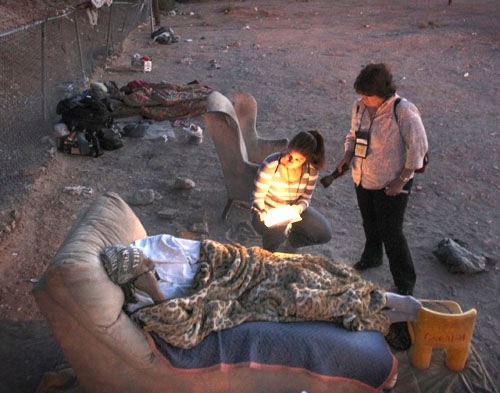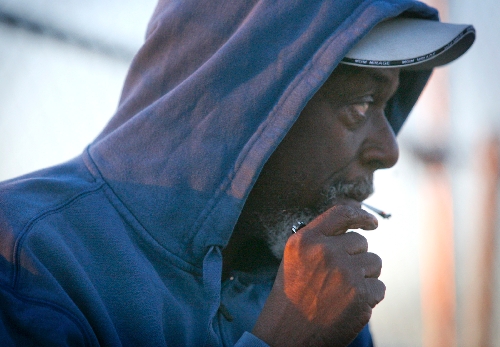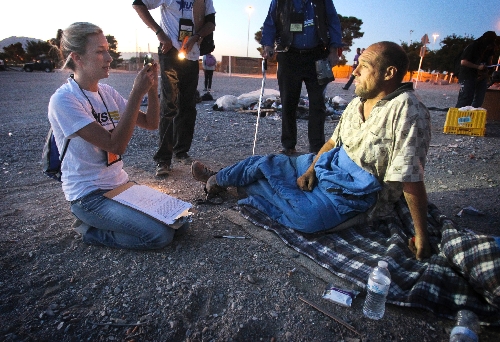Survey aimed at most vulnerable homeless veterans in Las Vegas
Abdullah Bey takes a long drag off a hand-rolled cigarette as he answers questions about whether he panhandles, uses drugs or has any medical conditions.
That information will be stored in a database by local advocacy groups to keep track of the chronically homeless, determine what resources are needed and identify 50 of Clark County's most vulnerable homeless veterans.
The goal is to find them permanent housing based on a system that ranks how likely they are to die on the street.
Bey, 57, has been homeless since he recently got out of jail for an old bench warrant. The Gulf War veteran served 17 years in the Air Force servicing equipment for fighter pilots. But he was discharged after failing a drug test.
Then he lost a data entry job when the recession hit.
"I want a place to stay," Bey said. "I have sleep apnea, so I need electricity for my machine. I shouldn't be outside sleeping. I try to find a job every day, searching on the computer."
Before the sun came up Monday, dozens of volunteers ventured out into pockets of homeless communities in downtown Las Vegas. They stood outside tents, tarps and cardboard boxes in empty desert lots littered with trash and broken glass to talk to people who cram their lives into shopping carts.
A BASE LINE
Tyrone Thompson, regional initiatives coordinator with the Southern Nevada Regional Planning Coalition, said the survey was the first conducted in the county. It used information from last year's homeless census.
"This is really going to help us just have a better strategic focus and also knowing a little bit more about our street homeless," Thompson said.
The group is working with several organizations including the Department of Veterans Affairs, the Metropolitan Police Department, the Nevada Homeless Alliance and the 100,000 Homes Campaign - a national effort to house 100,000 of the most vulnerable homeless through donations and other resources.
Monday was the first day of the two-day survey, which wraps up today. Results are expected later on in the week, Thompson said.
"If they continue to live out in the community as is, the likelihood of dying, if they have medical conditions, we need to address those," Thompson said. "We're hoping with that effort to step in and offer that help. That doesn't mean we'll look at this list and that's the only order in which we'll observe homeless. It's a great tool. It will help our base line."
Michael Shore, operations director for the national campaign, said Las Vegas' population is more visible than camps in Phoenix, a previous stop.
"This puts a name, face and health conditions on homeless," Shore said. "It makes homelessness a public health issue, which it is."
The national campaign has housed 16,944 people in 135 communities nationwide.
UP CLOSE AND PERSONAL
County Commissioner Mary Beth Scow pounded the pavement alongside volunteers and asked questions Monday. "I wanted to see it up close and personal," Scow said. Her observations concluded that drug use is a major cause of homelessness.
But childhood memories came flooding back to the commissioner in the process, as she remembered taking food, blankets and cigarettes as a little girl to a homeless relative living on the street in Denver.
"It was hard to understand that as a child," Scow said. "But this is really eye-opening."
If the veterans agreed to take the survey, they got a free breakfast at the U.S. Vets facility on Bonanza Road.
Ronald Moore, 68, munches on scrambled eggs, bacon and biscuits as he chats about his four-year stint as a truck driver for the Air Force in the 1960s. He proudly mentions kicking a nasty heroin habit 30 years ago, but his face falls when he talks about sleeping in his sleeping bag in a field on Washington Avenue.
"It ain't no problem, but it gets pretty cold and windy, boy," Moore said. "It wasn't too nice a few nights ago. You got a lot of crazy people and a couple of old ladies, too. It's sad."
He said he wants a roof over his head.
"It would give me stability," he said.
Traffic buzzes by as the sun peeks over the mountains on Washington Avenue near A Street. The day is just beginning for Fred Dold, who agrees to take the survey after some haggling by Scow's liaison, Blanca Vazquez.
Dold is not a veteran, but his information will still be stored to help track resources. The 57-year-old Canadian doesn't have a green card. He came to Las Vegas a decade ago to gamble as a sports bettor. "I keep thinking that green card will fall out of the sky and into my hands," said Dold, who is from Toronto. "I can't get any food stamps or housing or into any programs because I don't have a Social Security number."
He's no criminal, but he can't figure out why he doesn't want to go home. "I've lost touch with my family," Dold said.
The drifter packs up his blue tarp that keeps out the neon lights of Fremont Street, and he's gone.
Contact reporter Kristi Jourdan at kjourdan@reviewjournal.com or 702-455-4519.



















